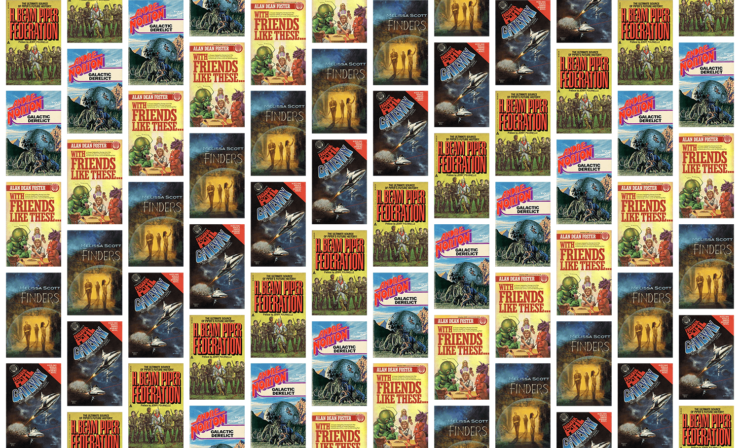Stories about precursors and forerunners appear frequently in science fiction (and fantasy). Why? For one thing, it’s just way cool to think that ancient civilizations and species might have risen and vanished long before we arrived on the scene. This is true in our real world. Why wouldn’t it be true of galactic civilizations? Also, relics of otherwise extinct civilizations play well in plots.
Consider these five works that employ this plot device in five distinct ways, using the existence of ancient forerunners to explore different speculative possibilities:
As a Commentary on Mortality…
It is said that a man once wished for something that would cheer him up when sad and bring him down to earth when he was too cheerful. He was given a ring inscribed with the motto “This too shall pass.” So it is with civilizations: they all seem to die, save for the ones too recent to succumb to natural processes.
“This too shall pass” is a running theme in the works of Andre Norton, from whom I stole the term “forerunner.” Forerunner served as her catch-all term for the many civilizations that rose and fell before the present day of her various novels. Galactic Derelict, for example, involves humans using time travel to appropriate a starship once crewed by the long-vanished alien Baldies. Ensuing mishaps provide a pointed lesson in the ephemerality of civilizations.
To Provide Convenient Shortcuts…
On occasion authors need to introduce advanced tech for plot purposes, tech beyond what the setting otherwise provides. One answer is to assume relics that have exactly the properties required (sturdy relics left over from past civilizations).
Robinette Broadhead, protagonist of Frederik Pohl’s 1976 Gateway, hails from a civilization whose best technology is barely up to the challenges of interplanetary travel. Rather conveniently for humans with interstellar ambitions, the long-vanished alien Heechee did not tidy up their Solar System asteroid base before they abandoned it. The base contains a thousand functional starships. Climb in a ship, push a few buttons, and you’re on your way to an unknown, pre-programmed destination. What’s in store at the other end? Possibly untold riches…or perhaps a horrible death.
To Serve as Valuable MacGuffins…
Forerunner sites seem to attract looters more often than they attract archaeologists. Looting—who can get there first and find something valuable, then protect it from rivals?—is the impetus for a great many SF plots.
In Melissa Scott’s Finders, the possibility of a big score keeps terminally ill Cassilde Sam and her partner Dai Winter on the trail of Ancestor relics. To date, their success has been marginal at best. Aware she will soon die, Sam is determined to leave Dai financially secure. An opportunity to do so presents itself—but there’s a catch… Sam and Dai will have to reconcile with their estranged lover, Summerlad Ashe. Is wealth sufficient motivation to overlook past conflict and seemingly irreconcilable differences?
The “Sealed Evil in a Can” Scenario
Too many ancient civilizations were prone to burying poorly labeled existential threats in what subsequently turned out to be insufficiently well-sealed tombs. If this were true of our own world, the profession of archaeology would much more dangerous than it is.
Alan Dean Foster’s 1971’s “With Friends Like These…” is the rare story about someone who frees sealed evil knowing full well that it’s evil. The evil is humanity. Long ago, the galactics confined warlike humanity to Earth. Faced with the even more aggressive Yop, the aliens conclude that freeing humanity is a price they are willing to pay for salvation from the Yop. However, humans have been trapped behind an impenetrable force field for millennia. Evolution has had its way. The humans the galactics free are not quite the same as the humans first walled away.
The Search for Illumination/Enlightenment
Deciphering an unknown script recording an unknown language would seem to be an impossible task. This story tells how some scientists managed the feat. This may sound as if it would be a dry and boring tale, but it isn’t.
In H. Beam Piper’s 1957 “Omnilingual,” (collected later in Federation) the challenge is not finding Martian records. The Red Planet is littered with repositories of ancient wisdom. The problem is, those records are written in a language unlike any on Earth and, having nothing analogous to a Rosetta Stone to serve as intermediary, translation appears permanently stymied by this insurmountable difficulty. It falls to archaeologist Martha Dane to do what her skeptical male colleagues cannot do: spot a shared element in Martian and Terran documents that will allow her to crack the puzzle of the Martian language.
***
There are just a few possibilities. No doubt some of you have favourites that I did not mention. Comments are, as ever, below.
In the words of fanfiction author Musty181, prolific book reviewer and perennial Darwin Award nominee James Davis Nicoll “looks like a default mii with glasses.” His work has appeared in Publishers Weekly and Romantic Times as well as on his own websites, James Nicoll Reviews (where he is assisted by editor Karen Lofstrom and web person Adrienne L. Travis) and the 2021 and 2022 Aurora Award finalist Young People Read Old SFF (where he is assisted by web person Adrienne L. Travis). He is a four-time finalist for the Best Fan Writer Hugo Award, and is surprisingly flammable.










